On a rainy evening in east London in October 2010, I slipped down a deserted side street, round the back of a rundown building, and knocked on an ominous-looking door. "Is this Boiler Room?" A nod. A jog up some stairs revealed an undecorated loft space that seemed to be a builder's dumping ground. Tucked away in the corner was a tiny room with a table, a bunch of music gear, and a webcam. Here, with little ceremony, Mount Kimbie, a London electronic duo who had recently risen to some notoriety with their debut album Crooks and Lovers, were about to play live for a small gaggle of their friends — and, excitingly, the internet. Live streaming was pretty new, and the air crackled with the feeling that something was happening.
At the time, mp3 blogs were king and the idea of making a living out of music seemed laughable. I was doing a lot of work for free, as was everyone else I knew in London. So when I spotted Blaise Bellville, the founder of music culture website Platform who had set up Boiler Room, leaning against the doorframe, I sidled up to ask him how he made it work. Was it as simple as ads? He laughed: pay-per-click ads weren't going to make anyone rich and Boiler Room wasn't even a business yet. It was a side project — a hobby, even — that Bellville and the small group of people involved did in their spare time.
How to make music a sustainable endeavor has been one of the biggest themes in the industry since the internet turned traditional revenue streams upside down. Yet in an era when countless music sites, labels, apps, and startups have noisily launched before quietly fading away, Boiler Room has not stopped growing. And each iteration has come wrapped in innovation, the latest being this weekend's Ray-Ban X Boiler Room Weekender in the Poconos. While large-scale music events have become most people's surest way of a paycheck, Boiler Room let the artists playing the Weekender give all the tickets away for free.
To find out why they're doing it, I caught up with Bellville over the phone from L.A., where he was prepping for this weekend's festivities. (If you can't make the Weekender, you can stream the whole thing online.) Here, he discusses recognizing the power of the global underground, turning Boiler Room into a successful business, and how they've kept growing without compromising their vision.
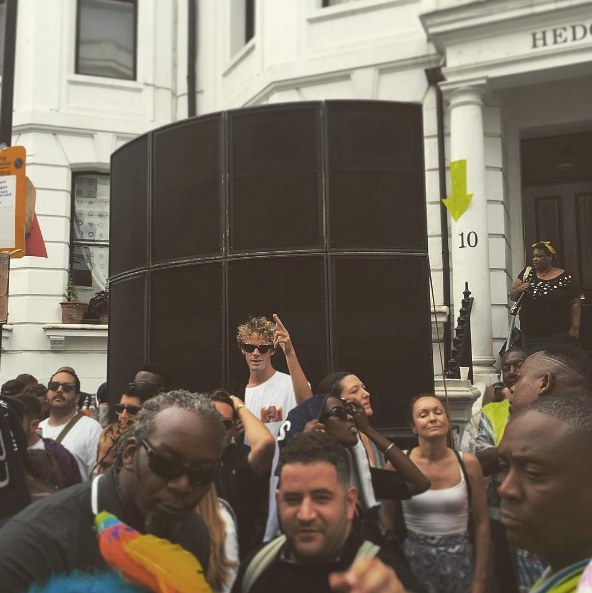 Blaise Bellville at Boiler Room's Notting Hill Carnival event, 2016.
Photo by Truce Susan
Blaise Bellville at Boiler Room's Notting Hill Carnival event, 2016.
Photo by Truce Susan
When did you realize you were on to something with Boiler Room?
For the first 6 or 8 months we did it, it was just in that tiny, tiny room and only 10-30 people made it. Over that period there was this clear recognition that it was a visual music format, and that visualization of music scenes — and the crowd that's sort of behind that scene — played an interesting role in our thinking. That, I think, sets you off to get to the next point where it became a fandom, where you sort of think, why is it that anyone would care about this room of people not really doing anything for the camera?
When we first met people who had been watching [Boiler Room], they would describe it as a keyhole into the U.K. music scene, and so that would start to shape your thinking of like, you know, why do these people matter? And you would come to the conclusion that having some visual context to these things that you read about — or heard little snippets of from overseas — helps you as a fan, wherever you are in the world, understand that these were tangible real people.
The first stage for me was understanding what that visual accompaniment meant and that was further compounded when it became an event almost by accident. There were two moments. One, when we moved to Berlin and we started doing our show there, and one where we moved to Pattern Cutting Factory in London, which was the biggest space [we’d been in]. The moment we got to an event, it touched on a sort of new state — a thing we all do in our lives, which is dancing and being at a party. That nucleus that forms around the DJ, and everything that comes with an event, had a corresponding impact online. It blew us up online because I think that visual moment was something that even more people have experienced wherever they are and could relate to when watching. That informs your balance between events and visual radio shows. Some things are suited to that bigger moment, some things are more specialist.
That obviously inspired to continue. The event format was something that felt very owned by us and encouraged us to take it to that second wave. Berlin was pivotal, too, because during that first year we were not a business; it was something that we did around all of our day jobs.
What made you want to expand outside of the U.K.?
[Musically], we're very rich in London and [we were] cycling through these different collectives and faces and people making up the U.K. music scene, but we started thinking about the future and how we would continue from there.
You would wonder if you were in an echo chamber of the London music scene. If everything was being built up of this global audience then it was important to consider there might also be more scenes to rep for, and that first show in Berlin was a huge sublime moment for us because it was an experiment. What if we go and play the same left-field curatorial policy to Berlin and see if we have the same reactions? Would the fanbase we built off watching the U.K. scene resonate with that new one being introduced in Berlin and whether that would multiply? And it did — it had a phenomenal reaction and that was a pivotal moment for us.
How did that impact your plans to grow?
We really had two parts in our minds as to how we expand, and one part was, like, reach for the stars [in terms of artists bookings]. But, you know, there are only a few Radioheads in this world. Does that mean we have to work with pop artists? It just didn’t really feel like us — it's really about curation and it just felt wrong.
The other end was like, if there are these amazing scenes in London, Berlin, New York, and L.A., then continuing our policy and scaling it all around the world would avoid us having to exhaust anyone's city too much and would provide a fascinating, very unique long-term curatorial plan. We're going to cover global underground music, rather than start at the underground in London and [end up] selling out to pop.
There was a predicament that we saw in music, which was like, you could only do the good stuff to a certain point, even if you were an artist. There was this continuing thing where you'd see artists emerge from the underground scene and then as soon as they diverge to a big audience, they would in some ways have to compromise their vision and their music would change to be more festival-friendly.
So Berlin was that moment, and it's also the first time that I met fans from abroad who'd been watching it and got to hear why they cared about it. And actually to see these people were more than you know, arbitrary statistics, they were real faces. I think we came from a culture where like, at the time, we were very much still thinking of like TV numbers.
What do you mean by TV numbers?
You would look how many [viewing] numbers TV shows would command — like five million or so — and it always just felt like, who were those people? You couldn't really imagine anyone behind those numbers. And then we'd look at our numbers, which were more in the tens or hundreds of thousands at the time, and I remember actually meeting [Boiler Room fans in Berlin] being like, these people are die-hard music fans. It changed my idea [of what it meant] if we had 20,000 people watching a show. Rather than going, oh, 20,000 compared to TV numbers, that's nothing, I would go, that's 20,000 people who are the kinds of people who'd buy tickets to see musicians in stadiums and clubs. That became quite a powerful motivation.
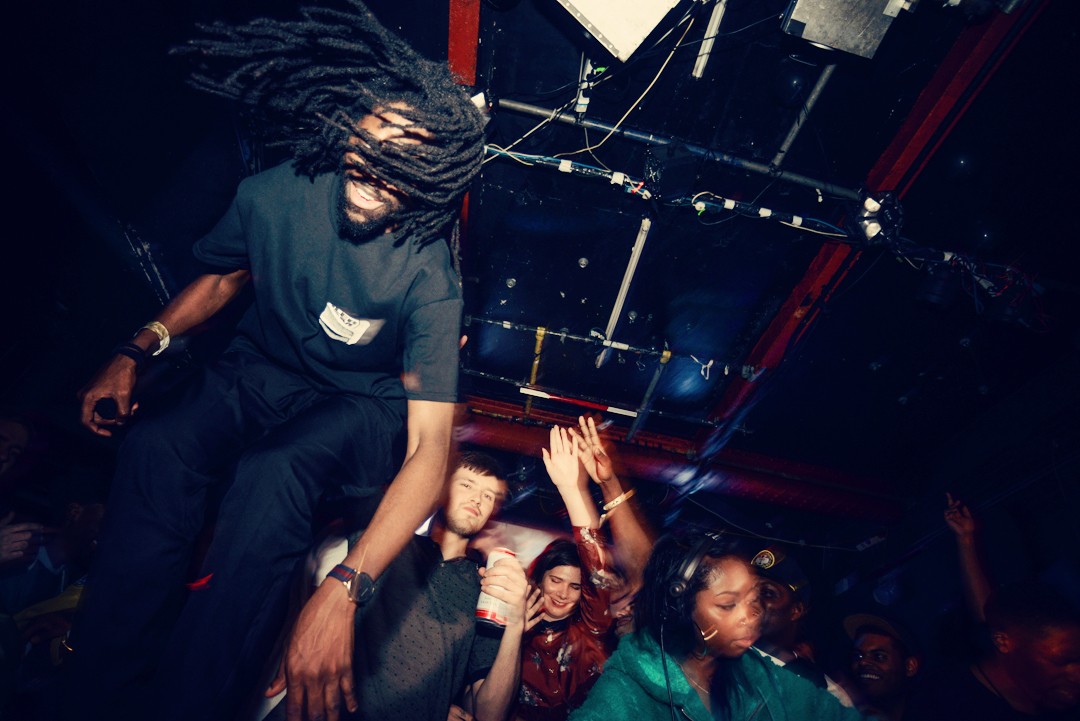 Boiler Room host Skinny Macho and DJ Siobhan Bell at the London leg of Boiler Room 5th Birthday party, November 2015.
Photo by Samuel Apperti
Boiler Room host Skinny Macho and DJ Siobhan Bell at the London leg of Boiler Room 5th Birthday party, November 2015.
Photo by Samuel Apperti
“Why would you not want good music to be appreciated by as wide of an audience as possible?”
Boiler Room came along around a time when electronic music was gaining a lot of traction on a bigger stage, and the global underground was starting to become more linked-up.
Pop culture is being completely democratized. It's so weird ‘cause you look back on everything pre-internet and the idea of who can tour around the world and maintain a career off of music has changed from eight big stakeholders, who sort of run everything, to this entire other world, where thousands of [smaller] artists are touring and surviving. There is an audience for that that's almost as big as what we traditionally thought of as mainstream.
It's always been like mainstream and then underground. The underground's been absolutely tiny, but now mainstream and underground are more musical choices you make than they are the size of the actual audience — I think the underground audience in that culture is fucking huge now. Like, to have a diverse interest in music, to be looking to alternative sources to how you discover music, that is now a mainstream choice.
A lot of people don't like it because I think, you know, a lot of people have grown up pre-internet and have fantasized over certain types of very grassroots underground culture — how those kids in those VHS rave videos look and everything. It's all been so romanticized and quite protected and closed. When I would watch Boiler Room videos back on the archive, grime videos always spoke to me in that same way. The types of comments [on the videos] were kind of very in-the-know towards that genre. It would really evoke this feeling of like, what I'm interested in is actually a movement.
If you grew up at the end of the ‘90s, or at the beginning of the internet era, you almost felt like you didn't have your [cultural] movement. You heard of these movements happening up until the end of the ‘90s, and hip-hop was a distant thing that started 10 years before, [but] there was really nothing that we could our own.
[So] we started to say we broadcasted the underground; we’d started a very underground music culture and we started to make that more of a thing we did. But I think [it was happening] — even just seeing artists starting to tour way earlier than they could've because booking agents were circulating their DJ set videos from London, in Barcelona, and a fanbase was growing. All those little factors definitely, I think, qualified an overall feeling we had that this is something we, as a generation, own and we understand that a lot of people don't.
What are some of the tough things you've had to deal with as Boiler Room grew?
The prickly thing that I definitely noticed was us going from this absolute cultural movement — doing it all around our day jobs [and it having] that organic feel to it — to developing more of a program and, for our own sanity, finally building a website and putting stuff on YouTube and finding a revenue stream.
There was this burning thing in the back of my mind of like, we need to make sure that we stick to that original decision we made — we need to be a global underground broadcaster. That means going into genres that are not always for the DJ. That was the long-term goal that would take awhile to actually come to fruition because there were complications with it.
And I guess the other thing [that was tough] was there were these sort of guardians of underground music culture who, ironically, would call us elitist, but I actually felt like they were elitist. They were the people who were privy, once upon a time, to being part of a rich underground music culture and they think because there was pirate radio in London, there was pirate radio everywhere. I'd be like, actually you're talking shit, what you're saying is elitist, what we do is enable that very local, offline, non-available thing traditionally to be available to people wherever they are. As long as they have the internet, they can find it, and they can pursue that passion, and that is fairest — and, actually, for an artist to want to develop a career and go around the world, that is the most encouraging thing for this genre of music we're calling underground.
The fact that more people wanted to hear this music meant that you could kind of be like, I don't really give a fuck what you think, you know? You're just being an old-school like rave-head who was lucky enough to go for that stuff, and why would you not want good music to be appreciated by as wide of an audience as possible?
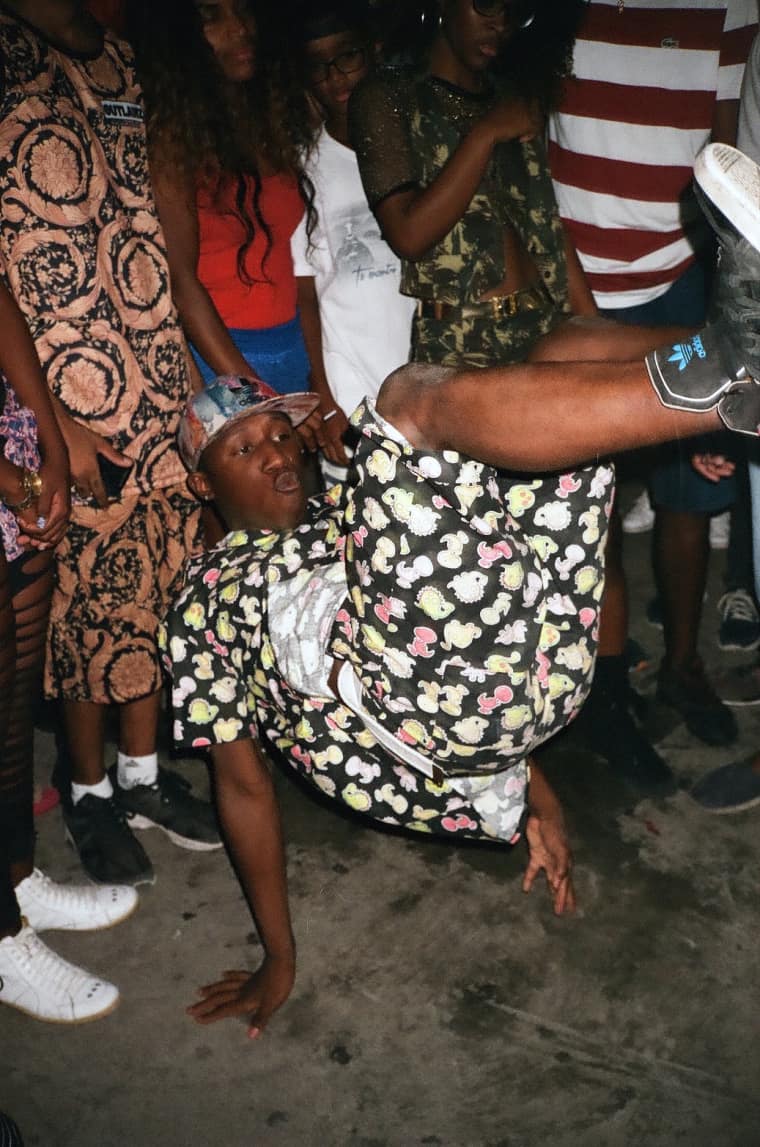 A baile funk dancer during Vinimax's set at the top of the Vidigal favela in Rio, January 2016.
Photo by Angela Stephenson
A baile funk dancer during Vinimax's set at the top of the Vidigal favela in Rio, January 2016.
Photo by Angela Stephenson
 Grime MC Rocks, performing during a Logan Sama x Boiler Room takeover at the ICA, May 2015.
Photo by Angela Stephenson
Grime MC Rocks, performing during a Logan Sama x Boiler Room takeover at the ICA, May 2015.
Photo by Angela Stephenson
At what point did Boiler Room start to make money, and how? How do you take the money without taking the money? You must've had offers from a whole bunch of people.
It was about 8 months in and I was using this space that was part of another business, which was a disaster, and I was really burned out. I was having all kinds of personal stress anxiety, biting off more than I could chew. I was just in this swing between being entranced and excited about what Boiler Room was becoming in this organic way. And wanting more and more to make that everything I focused on, but also being pulled back into real life six days a week where I was doing three full-time jobs at once. I was developing a warehouse into 21 studio flats, photographic locations; it was fucking crazy. Plus running Platform and doing club nights and DJing. After 8 months, no matter how exciting it was, I was like, This is not sustainable. I'm going to have a fucking breakdown if I carry on like this.
When it came to bringing revenue in [for Boiler Room], I had experience in the traditional advertising world and I didn't want to go down that path. And we didn't have a website so we thought about it as much as possible, rather than taking money in an automated sense. We would rely on conversations and real world things that felt right to a certain degree. We wanted to feel like we were offering something to them and they were offering something to us.
We started getting approached by brands who understood what Boiler Room was and [were interested in] non-traditional, completely integrated, bespoke partnerships. We did our first partnership in February 2011, which was the month we launched our website, a year after we started. We did it with RBMA which fit perfectly into the program. Three months later after an Umbro conversation, we did a partnership with them across the whole year. Then Red Stripe started after that. That set the standard for how I wanted to continue. On the one hand, [the partnerships] felt creatively interesting and, on the other hand, they felt financially like they actually recognized the work and reach we had. Actual partnerships with brands felt like the way to go. Since then we've turned that into a global operation.
What kind of impact has that had on what Boiler Room does?
I remember we started to talk about taking Boiler Room forward, using brand money to experiment. With our partnership with Ray-Ban, we've been running for four years now and we've had some creative moments with them. There’s been a lot of freedom to experiment in new areas. The thing that Ray Ban does is they really help us test out things that are bigger than us. We did a broadcast from a Roman amphitheater at Dimensions festival with Darkside and Caribou [in 2014]. It was beyond what we had ever achieved. We pulled it off and it was amazing. It opened up a door for us.
I remember we filmed Maalem Mahmoud Guinia, the Moroccan Gnawa musician, [in Marrakech, 2014] and filmed those sessions with musicians who had never been filmed before and were fundamentally against it, but who liked the philosophy of Boiler Room. Essentially it was taking the same policy and applying it to something that had nothing to do with a DJ set. It was beautiful, and has hundreds of thousands of plays on YouTube; it was a very amazing piece. Or if it's grime artist from Korea or some big scene in L.A. or some throat singers from Russia. It's those moments that make broadcasting the underground into a proud concept — showing this thing we all feel and know is a movement.
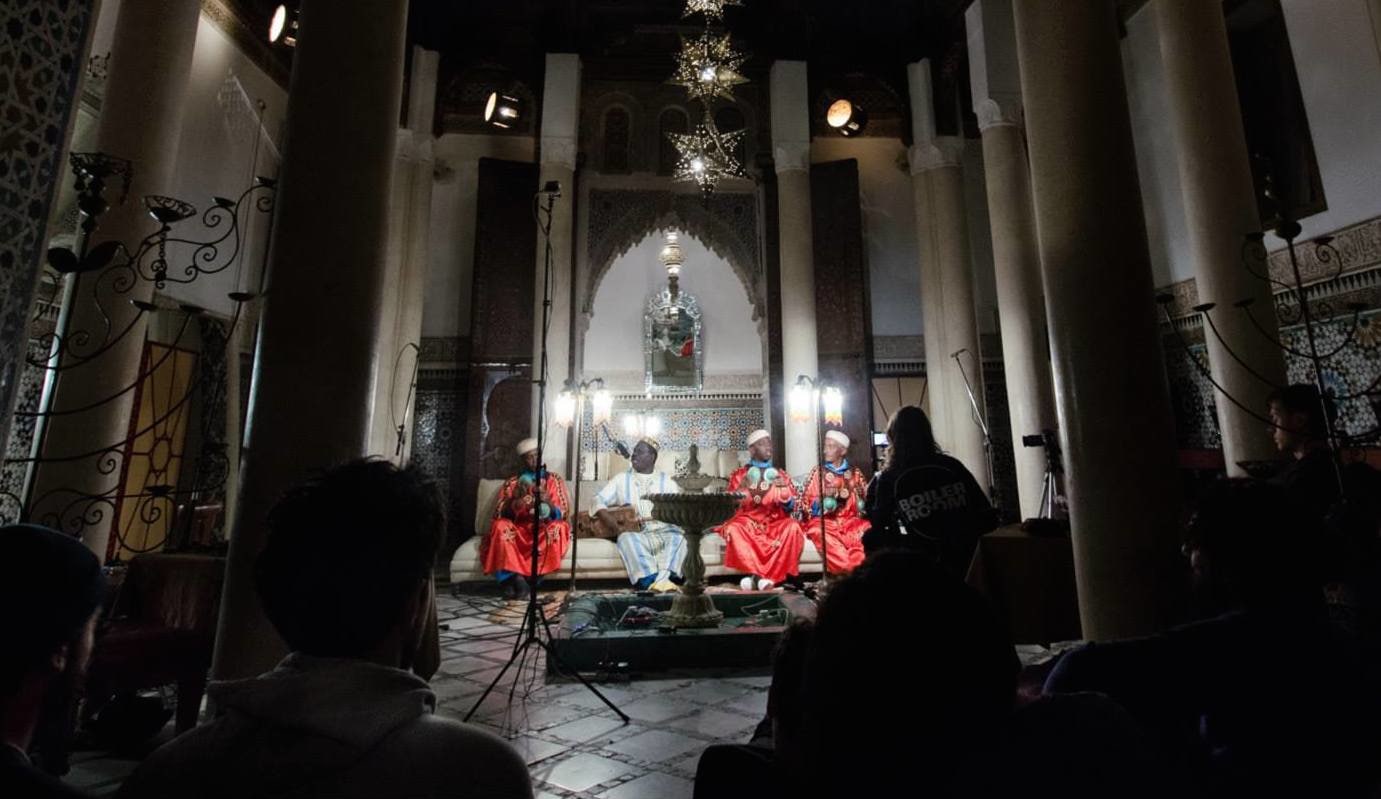 Maalem Mahmoud Guinia in Marrakech in 2014
Photo by Camille Blake
Maalem Mahmoud Guinia in Marrakech in 2014
Photo by Camille Blake
“There’s a network of brilliant people and the more they’re encouraged and the more we do as a group, we see that collective power of what Boiler Room is.”
How has the underground influenced Boiler Room?
I went to Japan two years ago and I met up a guy called Naohiro Ukawa who owns Dommune; we'd been watching each other from afar and talking by email. Dommune was like Boiler Room in Japan and it started a few months before Boiler Room but I didn't even find out until about six months in. It was fascinating watching this other version of what we do. They had a natural venue and would live stream anything from underground dance music to Japanese pop. They still ran with the same philosophy of low cost production and an exciting team who was running with webcam technology but he was such a visionary director. I remember we went to dinner every night, hanging out and we shared ideas and tips. I remember coming back to London in June 2014 and turning around like, "We have to upgrade our entire production set up. We can upgrade the gear without becoming too expensive and it will allow us to expand our curatorial policy far beyond the DJ and dance music and be more consistent in that vision of representing underground music culture around the world.”
Why does Boiler Room need to do a festival?
I mean, we don't. Precisely because there are plenty of people doing festivals and doing them really well. I don't think we need to follow that model. I do think there is something to be said for us doing a large scale event which does stick to the core of our philosophy, because the model is naturally intimate.
There is a conflict to selling tickets on a mass scale. If your focus is to give everyone a remarkable moment to archive forever, you've really got to challenge yourself. You really have to question a traditional festival. To do it justice, you have to rethink it. We do want to have a lot of people in the right environment so people around the world can see something very different. The two most important factors were, firstly, location — it has to feel like something is an appealing, intimate, private space different from the others. The other is how we market a festival and distribute tickets, and that's why I was like, the second we sell 3,000 tickets, we have to assume a headliner who will book those tickets and advertise everything against them and that will restrict us creatively and performance-wise. So we decided to involve curators and artists who, in their own way, can decide how they want to distribute their tickets; that's the only way you can get to this festival.
[That way] we'll have a great environment where there is not a VIP and public dynamic. We don't want there to be a weird distinction between those who have tickets and those who came to perform. That doesn't feel right to the underground scene. There are a lot of amazing underground festivals now but a lot of them still have a VIP section. I think distributing tickets and letting other people get them out there should have a really nice effect. Everyone who's there will be ready to discover music, and not the same headliners that are at every other festival.
This seems like dream sponsorship deal to young labels and collectives, to get a brand to pay for everything. But is that the case?
I think that takes four years of trust. No one just does sponsorship deals anymore unless you're like a football stadium. This is an evolution of let's recognize there is a massive audience to be reached. We think the curator model of Ray Ban and Boiler Room together has unlocked these ideas and scaled them into what we really wanted to do. The simple answer is that it's definitely not easy. We're losing money and we haven't managed to get anyone to fund the entire vision but we've got there through four years of building and establishing relationships and trust, and then taking a leap on it. That doesn't happen often. Any partnership we do with brands is essentially passing money through to early stage artists; we're helping bridge that big gap between corporate brand sponsorship and proving that investing in these artists and scenes is worthwhile. You have to start somewhere and start building relationships.
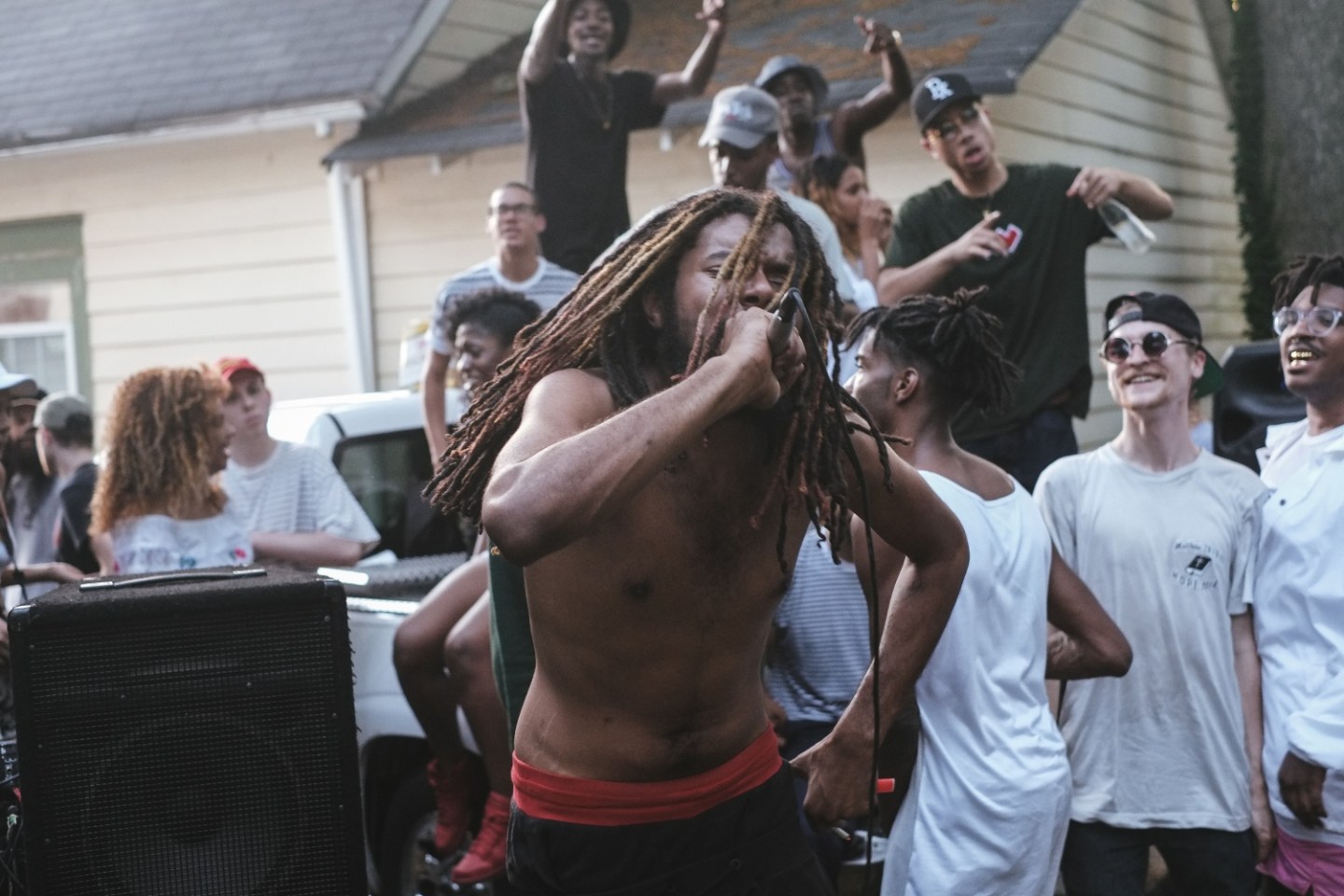 Rich Po Slim at the Awful Records Boiler Room show in Atlanta, 2015.
Photo by Brandon EatHumans
Rich Po Slim at the Awful Records Boiler Room show in Atlanta, 2015.
Photo by Brandon EatHumans
I was really excited to see that the Boiler Room Weekender line-up embraces lots of smaller collectives who are making their own movements, like NON and Discwoman.
It'll be so interesting to see what happens off-camera as well. All of those people in one place who are doing these fascinating things, who are at the beginning of what they're trying to build, meeting each other, and hanging out, meeting with fans. It's a melting pot situation. We wanted to do a mass scale event but we had to book the people who stood for our policy, who want to grow, and are in that beginning point, and create an environment in which that can actually work.
What are you proudest of with Boiler Room? Considering that you're in an interesting situation because you're very passionate about music and the culture but you have an incredible business mind. You're obviously getting help and support but there is innovation on both sides. What makes you stop being restless?
When we do a show that's really fucking good, that makes me genuinely excited. It's still going back to the base moment of being in that warehouse in the first year. Just occasions where Hype Williams was in there playing and then Sampha jumped on the mic. These are genuine musical moments that have never happened in such abundance ever in history because there has never been a massive underground scene. Our generation has actually got a great pool of talent. There has never been this many musical moments that have been documented. Even back in the day of rock bands in the ‘60s, no one was documenting things at that point. That's exciting and as a core product of what we do, broadcasting and capturing the underground, I think that's hugely rewarding.
The other side is that Boiler Room has the chance to innovate further and further. We just yesterday announced we're opening the world’s first virtual reality venue. That's something that's going to be mad. If you take that leap and go, people could live in entirely different worlds. I wanted to set ourselves up now to build this venue in London and use it as a 1.0 VR, but 2.0 for Boiler Room as a brand, to experiment in that space as it goes. We should be the first be the first app you land to on any smart TV, any Xbox or PlayStation, any mobile device. We should have a lean back viewing experience. We can use our brand to get in the door, what allows us the chance to be forward thinking. When you go from [employing] 4 to 60 people, you really start to like... There are so many fucking amazing people. It goes from steering completely [on my own] to doing things like the VR venue that would have never of grown if I never met [Boiler Room staff member] Zack who found that project and funding for it. The idea is that it's not all on me, there's a network of brilliant people and the more they're encouraged and the more we do as a group, we see that collective power of what Boiler Room is. We can stimulate that business and creative side and have the outlook to do that in Boiler Room. You start to have the belief that you can always be pushing things forward.